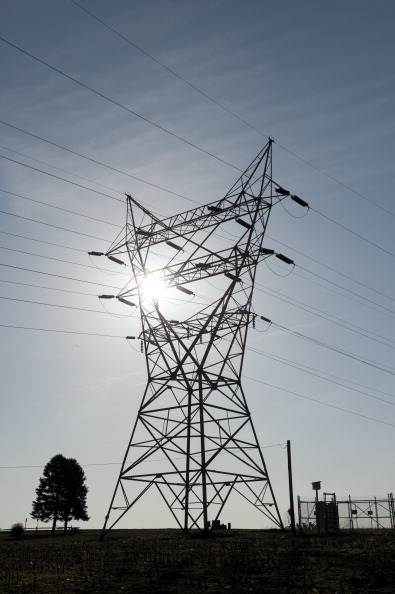PJM will study ‘fuel security’ of electric grid as natural gas use rises
-
Reid Frazier/The Allegheny Front

Stan Honda / AFP/Getty Images
Towers carrying electricity in Lancaster County, Pennsylvania from the Peach Bottom Atomic Power Station, a nuclear power plant in Delta, Pennsylvania.
As low natural gas prices force more coal and nuclear plants to retire, the grid operator for 65 million customers in the mid-Atlantic region says it will look at whether it’s becoming more susceptible to outages forced by extreme weather or cyber-attack.
PJM Interconnection, which operates the electric grid for a 13-state region, says it will conduct a study over the next several months “to understand the fuel-supply risks in an environment trending towards greater reliance on natural gas.”
The operator says it will take several months to study whether its system could withstand events like a pipeline shutdown, a cyber attack on a natural gas delivery system, or a prolonged cold snap.
Speaking to reporters on a conference call Monday, PJM’s CEO Andy Ott said even with recent coal and nuclear retirements, the grid is well-balanced and “fuel secure” right now. But he said PJM is looking at whether it will remain that way as natural gas takes up a greater percentage of electric power generation. Developers have proposed 40 natural gas power plants in Pennsylvania alone, and natural gas has overtaken coal as the country’s top electricity source.
“Are we going to find ourselves in a situation where we are over-dependent on one type of fuel delivery infrastructure,” Ott said. “If a pipeline would be compromised, does a (power plant) have sufficient backup, or (have) multiple ways to get fuel?”
He said that “fuel security” for a natural gas plant could include an ability to generate electricity using multiple sources — like diesel or kerosene, or liquefied natural gas, which can be stored on-site and shipped in tankers, in the event of a supply disruption.
“How long can the unit continue to operate with its on-site fuel? Is it a day? Is it two days? Is it three days?”
Disruptions could come as a result of a cyber-attack on a pipeline, or a weather-related event, like the recent bomb cyclone in January, which caused electricity use to spike.
“Say the recent bomb cyclone had lasted more than five days. What if we’d have been cold for three weeks?” Ott said. “Would we have had enough of these types of fuels? We’re not sure. We’re going to study that.”
A similar question was raised by the Department of Energy, which proposed a rule that would have guaranteed profits to plants that can stockpile 90 days worth of fuel on-site. Only coal and nuclear plants, which have been hurt by the rise of natural gas, can do that. The Federal Energy Regulatory Commission killed that proposal in January because it failed to demonstrate how coal and nuclear retirements posed an immediate threat to the grid.
In March, Ohio-based utility company FirstEnergy announced it was deactivating three nuclear plants in Pennsylvania and Ohio, unless it receives federal or state help. PJM said Monday that it had completed its analysis of the proposed deactivations, and found that the closures would not impact the reliability of the grid.
FirstEnergy is asking the Department of Energy to declare a grid emergency to help keep its struggling coal and nuclear plants online.
















